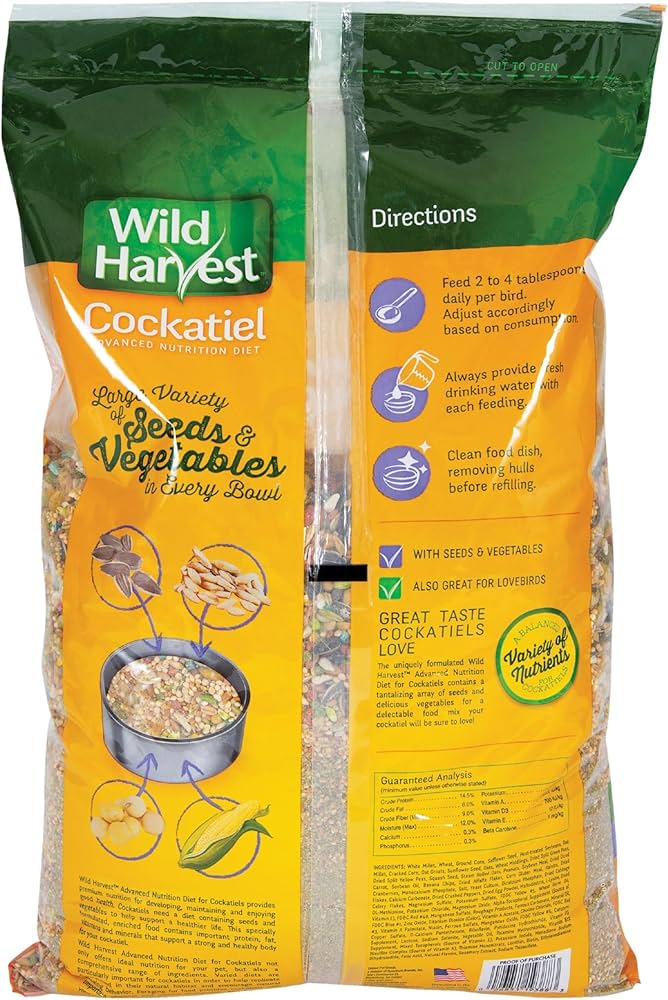Cockatiel Dietary Essentials
Essential Nutrients for Cockatiels
Keeping cockatiels spry and happy requires more than just a pretty cage and a cheery whistle. These delightful birds need a diet packed with the right stuff to keep their feathers shimmering and their antics lively. Here’s what’s on the menu:
- Protein: The building block for muscles and tissues. Basically, it’s what makes them look like the proud squawkers they are.
- Vitamins: Especially Vitamin A, which keeps their metabolism humming and prevents health hiccups. Skipping it can lead to dull feathers or worse.
- Minerals: Like calcium for sturdy bones and eggs, they keep the shell game strong and avoid the dreaded egg-binding.
- Carbs: Cockatiels are busy little creatures, and carbohydrates provide the pep for all their activities.
- Fats: Not too much, just enough to keep feathers sleek and skin healthy.
- Water: Always on tap. Fresh and clean, all day, every day.
For the best feathered-friend diet, pelleted food made just for them should take the spotlight—think 60–70% of their daily munching. Veggies and fruits add a bit of flair, making up a neat 30%, while treats (like seeds) are the cherry on top at no more than 10% (PetMD).
| Nutrient | Part of the Diet |
|---|---|
| Pelleted Food | 60–70% |
| Vegetables and Fruits | Up to 30% |
| Treats (e.g., seeds) | Up to 10% |
Common Dietary Problems
Get the diet wrong, and your cockatiel might not be at their chirpiest. Here are some common roadblocks:
- Vitamin A Shortage: Leads to breathing problems and sad-looking feathers. Carrots and leafy greens are like superhero capes for them.
- Low Calcium Intake: Especially tough on the girls—they need calcium for strong bones and proper eggs. Lack of it can mess with their egg-laying duties.
- Too Many Seeds: Sure, they’re tasty, but too many seeds can lead to a podgy parrot. Seeds alone aren’t balanced; they’re more like potato chips for birds.
- Thirst Troubles: Always keep the water fresh. Think bottled instead of tap if your local water isn’t the best.
Tackling these issues means keeping an eye on what’s in the dish and mixing it up often. If you’re just starting with cockatiels, check out our cockatiel care guide for more tricks to keep them peppy and satisfied.
Seed vs. Pellet Diet
Keeping your cockatiel happy and healthy starts with what they scarf down, and the age-old debate between seeds and pellets can leave you scratching your head. Cockatiel aficionados have long chewed this fat, so let’s get to the meat (or the millet) of the matter and figure out what’s best for your feathery chum.
Importance of Seed Diversity
Seeds are like the candy for cockatiels, but too much candy can leave them singing the blues nutritionally. Sure, seeds taste great and make you the bird version of a Santa Claus, but they fall short on the vitamin and mineral front (VCA Hospitals). To spice up their menu, toss in a variety of seeds to cover more nutritional bases.
| Seed Type | Key Nutrients | Role in Diet |
|---|---|---|
| Millet | Carbs, Fiber | Primary seed mix |
| Sunflower | Fats, Vitamin E | Small splash |
| Safflower | Fats, Protein | Medium level |
| Canary Grass | Protein, Fat | Little bit |
Seeds should just be a little sprinkle in their diet salad. Mixing up the seed selection helps, but they won’t knock out all nutritional holes. Pair those seeds with other goodies to keep your birdy’s belly happy.
Transitioning to Pelleted Diets
Pellets are like multivitamins—packed with everything birds need to tweet about a nutritious life. Aim for pellets to take up about 75-80% of their chow. Making the leap from seeds to pellets isn’t always a cakewalk, so prepare yourself for some picky beak action.
Steps for a Smooth Change:
- Introduce Slowly: Sneak in a few pellets with seeds. No sudden surprises—birds don’t like them.
- Watch Those Munches: Keep an eye on it, make sure they’re noshing on those pellets.
- Vet’s Wisdom: Get a bird-brained vet’s input if things get tricky (NP Vet Group).
- Chill Out: This switch could take a while. Relax, don’t rush, stick with it.
| Food Type | Nutritional Value | Shift Strategy |
|---|---|---|
| Pellets | Total nutrition (75-80%) | Gradual takeover |
| Seeds | Lacking nutrition | Phase out slowly |
| Fresh Foods | Vitamins, Fiber | Daily servings (20-25%) |
For the nitty-gritty on getting your bird on board with pellets and making sure they’re well-fed, pop over to our articles on cockatiel pellets and cockatiel care. Focusing on pellets means you’re setting your birdie buddy up for a balanced diet and a chirpy life.
Fresh Foods for Cockatiels
Mixing things up with fresh foods can work wonders for your cockatiel’s health. Just like us, these feathered friends thrive on a diet overflowing with variety and nutrients. Packing in those vitamins and minerals might not happen if they’re stuck munching on seeds and pellets. Here’s a handy guide to what fruits and veggies are a thumbs-up for your cockatiel and a heads-up on what to skip.
Safe Fruits and Vegetables
You know how you aim for 5-a-day? Well, for cockatiels, fruits, veggies, and greens should make up about a quarter of their meal plan. Give ’em a good scrub, chop ‘em into birdy-bites, and keep them separate from seeds.
| Fruits | Vegetables |
|---|---|
| Apples (core out the seeds!) | Carrots |
| Bananas | Broccoli |
| Oranges | Peas |
| Grapes | Spinach |
| Strawberries | Bell Peppers |
| Blueberries | Kale |
If you’re curious whether your bird can nibble on apples or other specific treats, check out our detailed guides on can cockatiels eat apples.
Heads Up: Steer clear of fruit seeds and pits—some are birdie-baddies.
Cautionary Foods to Avoid
Some foods sound harmless but could spell trouble for your cockatiel. Keep these off their menu to dodge any health hiccups.
| Foods to Avoid | Why They’re a No-Go |
|---|---|
| Avocado | Seriously toxic stuff |
| Onions | A stomach disaster |
| Garlic | May cause anemia |
| Rhubarb | Loaded with toxic oxalates |
| Fruit Seeds/Pits | Cyanide carriers |
| Sugar/ Salt Loaded Cereals | Not bird-friendly |
For a deeper dive into what’s on the naughty list, check out PetMD and Cockatiel Advice 101.
Bringing safe and yummy foods into the mix does more than just fill their bellies; it keeps your cockatiel feeling chirpy and healthy. Want more on nurturing your fine-feathered friend? Peek at our cockatiel care article.
Hydration and Health
Keeping your cockatiel hydrated isn’t just a good idea; it’s a big deal for their health. The right amount of water keeps everything running smoothly inside them and wards off potential health hiccups.
Water Requirement for Cockatiels
Your feathered friend needs a steady supply of fresh water every day. It’s like their security blanket, and without it, all sorts of things can go haywire. You don’t want that smelly bacteria stuff growing in their drink, so freshen it up daily. Sometimes tap water’s iffy, so bottled might be the way to go (VCA Hospitals).
Whether it’s a good old bowl of water or a fancy dispenser, each has its perks, just keep them spic and span (ZuPreem).
Here’s the scoop on what cockatiels need in their water game:
| What They Need | Explanation |
|---|---|
| Fresh Water | Clean daily, bottled if needed |
| Always Available | They need a 24/7 water buffet |
| Options | Bowls or dispensers – take your pick |
| Cleanup | Daily scrub-down of the water source |
Risks of Dehydration
Dehydration can really mess with your bird. Know the signs so you can jump in early. Here’s what happens if they aren’t getting enough water:
- Changing Appetite: They might pass on the birdseed buffet, risking an unhealthy skinny frame.
- Moody Blues: You might notice them getting cranky or just plain sluggish.
- Look Different: Check for sad, sunken eyes, dry beaks, or saggy skin.
- Major Issues: Long-term dehydration can hurt their organs and even be life-threatening.
Make sure there’s always some tasty clean water in reach. Watch and listen to your cockatiel for signs of dehydration and do something fast if they pop up.
Want the lowdown on keeping your bird in tip-top shape? Have a look at our other cockatiel care pages to boost your bird-care smarts.
Staying on top of your cockatiel’s water needs keeps them chirpy and in good health. Be ready to tackle any dehydration signs and keep that drinking water fresher than a daisy.

